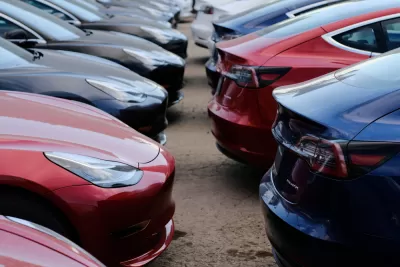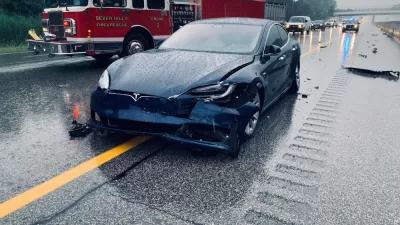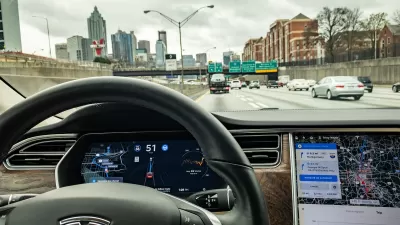Federal regulators are asking the carmaker to update the software on vehicles equipped with FSD due to its poor safety record.

Months after California banned Tesla from using the term ‘full self-driving’ or FSD, citing safety concerns, the National Highway Traffic Safety Administration (NHTSA) directed the company to recall 362,758 vehicles equipped with the software. Richard Lawler reports on the story for The Verge.
Documents filed regarding the recall (included below) don’t call out specific incidents, but NHTSA’s concerns are listed as focusing on four specific situations that can happen on the road, like navigating intersections during a “stale” yellow light, how long cars stop at a stop sign when the intersection is clear, how they adjust speed while driving in areas where the speed limit is changing based on road signs the car detects and settings put in place by the driver, and how the cars change lanes to get out of a turn-only lane.
While FSD requires the driver to “stay fully engaged” in its operation, “FSD-equipped Tesla vehicles will speed up and slow down on their own, make turns — including unprotected left turns, which are extremely difficult for automated systems — and recognizes traffic signals and other road signs.”
Tesla says it will implement a software update to address the NHTSA’s concerns, which won’t require car owners to bring the cars to a dealership. In addition to the recall, “NHTSA has been investigating Tesla’s driver-assist technology for several years, focusing specifically over a dozen incidents in which Tesla vehicles equipped with Autopilot crashed into stationary emergency vehicles. That investigation is much more expansive, covering up to 830,000 vehicles.”
FULL STORY: Tesla recalls 362,758 vehicles equipped with Full Self-Driving beta for ‘crash risk’

Alabama: Trump Terminates Settlements for Black Communities Harmed By Raw Sewage
Trump deemed the landmark civil rights agreement “illegal DEI and environmental justice policy.”

Planetizen Federal Action Tracker
A weekly monitor of how Trump’s orders and actions are impacting planners and planning in America.

The 120 Year Old Tiny Home Villages That Sheltered San Francisco’s Earthquake Refugees
More than a century ago, San Francisco mobilized to house thousands of residents displaced by the 1906 earthquake. Could their strategy offer a model for the present?

In Both Crashes and Crime, Public Transportation is Far Safer than Driving
Contrary to popular assumptions, public transportation has far lower crash and crime rates than automobile travel. For safer communities, improve and encourage transit travel.

Report: Zoning Reforms Should Complement Nashville’s Ambitious Transit Plan
Without reform, restrictive zoning codes will limit the impact of the city’s planned transit expansion and could exclude some of the residents who depend on transit the most.

Judge Orders Release of Frozen IRA, IIJA Funding
The decision is a victory for environmental groups who charged that freezing funds for critical infrastructure and disaster response programs caused “real and irreparable harm” to communities.
Urban Design for Planners 1: Software Tools
This six-course series explores essential urban design concepts using open source software and equips planners with the tools they need to participate fully in the urban design process.
Planning for Universal Design
Learn the tools for implementing Universal Design in planning regulations.
Clanton & Associates, Inc.
Jessamine County Fiscal Court
Institute for Housing and Urban Development Studies (IHS)
City of Grandview
Harvard GSD Executive Education
Toledo-Lucas County Plan Commissions
Salt Lake City
NYU Wagner Graduate School of Public Service





























